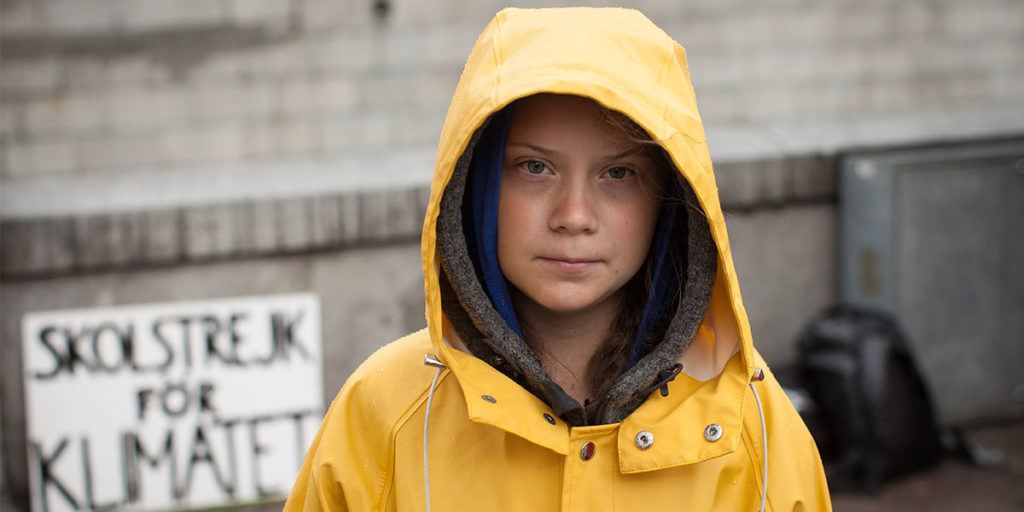I Am Greta

Image courtesy TIFF.
In his 1984 editorial in Hermes, the Columbia Business School Journal, titled “The Superinvestors of Graham-and-Doddsville,” investor and philanthropist Warren Buffett explained Time Value of Money—the central precept behind all modern finance. It states that the future value of an asset is its present value plus compounded interest, and conversely, that the present value of that asset is the future value discounted by that premium.
But in the late seventeenth century France and England began accounting for accumulation of national wealth before gross national income and output were taken into account (Piketty, Capital in the Twenty-First Century). In simpler terms: It’s smarter to pay sixty cents for a dollar than the other way around, but for most of human existence we’ve spent that sixty cents again and again like there’s no tomorrow. As Louis Armstrong said, “There’s some folks that, if they don’t know, you can’t tell ’em.”
Today, based on the newest IPCC projections, Global Mean Surface Temperatures may likely rise between 1.5 and 2 degrees Celsius by the end of this century. What that translates to is Generation Z losing a collective $8.8 trillion in lifetime income. In ecological terms, we’ve cartwheeled across the wrong side of the TVM equation since before the industrial revolution.
I AM GRETA explores the rise of environmental activist Greta Thunberg in the public sphere. Born in Stockholm, Sweden, she gained some notoriety for initiating a climate strike that caught on in several countries, thanks in part to Arnold Schwarzenegger sharing a BBC clip about Thunberg on social media. Said Schwarzenegger in earnest, whose years of environmental activism associated his image equally with his cheesy 80’s action flick one-liners, “I love seeing someone who doesn’t just complain but gets out and does something about it.”
Thunberg, who is on the autism spectrum, began fighting for reform in August of 2018, staging the first of many school strikes—determined to stand fast until after the Swedish general election. After several passers by argue with or scoff at her, others begin to notice, ask questions, take interest, and rally around her.
With persistence, Greta’s efforts earn her an audience with the 2018 United Nations Climate Change Council (COP24). Other speaking engagements follow, including the European Economic and Social Committee in Brussels, during which Greta and some of her Belgian collaborators meet with French Prime Minister Emmanuel Macron who, impressed by the young girl’s accomplishments, asks, “How do you manage everything for school?”
Greta replies, “I work hard.”
“And you read a lot,” responds Macron.
“Yeah. I’m a nerd,” she answers, shyly, to which Macron reacts with hearty laughter.
But leisure soon turns to dread as her speeches fall repeatedly on deaf ears. She reprimands the Paris Agreement’s signatories for failing to set sufficient emissions goals to prevent irreversible harm to the ecosphere (the IPCC’s aforementioned 2°C threshold)—settling on half the reduction required (40%) by 2030.
One after another, conservatives in hysterics pepper the media landscape, convinced that she’s manipulated by adults for their agenda. Svante, her father, knows better. She’s made lists of facts, figures, sources; she’s done her homework. The son of an environmental scientist, no one prompted me to pick up L. David Mech’s 1966 book, “Wolf: The Ecology and Behavior of an Endangered Species,” or Watson & Crick’s “The Double Helix,” both of which I’d read in the eighth grade.
Director Nathan Grossman interleaves comments expressing climate change skepticism. The voices of denial, all male, stand in stark contrast to the diverse armies of protesters—led mostly by young women. From lip service to death threats—it’s disturbing to see a father have to learn CPR as a precaution—it feels like a never-ending, uphill climb.
As a profile in courage, I AM GRETA succeeds. But is the young activist—constantly second-guessing herself (see: impostor syndrome), keenly aware of her novelty as a photo op for world leaders to distract from their repeated failures to turn words into actions—content with a finished product that furthers her brand more than it educates, instructs, and moves us to effect actual policy change?
“Adults say one thing and do something completely different, all the time.”
– Greta Thunberg
I AM GRETA is currently screening at the 45th Toronto International Film Festival.